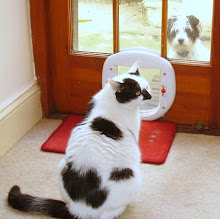I go to this bakery in Falmouth a lot. Himself buys their organic flour to make bread, and they make the best flapjack ever: full of fruit, seeds and not too sweet. Think I'll have to go down there later.... read about them here and in November's Cornwall Today.
THE IMAGINATIVE BAKERS - THAT SELL BOOKS!
Stone's Bakery in Falmouth is one of several artisan bakers emerging in Cornwall to make delicious products using high quality ingredients. Having started off two years ago from an industrial unit in Penryn and a stall on Falmouth Moor they have taken over a shop in the High Street and are selling out with their delicious baguettes, focaccia and sourdoughs, as well as speciality breads including garlic and thyme, and a spelt and honey loaf. They also sell a wide range of cakes, croissants and cheese straws and are renowned for their flapjack. And to cater for all tastes, they even sell books!
Oliver Kingdon, 29 and his wife Rosie, 28, seem a quiet, industrious couple but their faces light up when they start talking about their food. “We get our organic flour from three places – every mill produces a slightly different type of flour that suits different types of bread,” Oliver explains. “Stoates & Son are a Dorset firm that provide good wholemeal spelt and rye flour.”
“We did look into getting Cornish flour but there wasn't anyone who sold it on a large enough scale,” adds Rosie. “So we get white flour from Shipton Mill, and self-raising and plain flour for cakes from Doves. We tried them all out to see what suits which bread, and we've tried to go with smaller independent mills - they're more knowledgeable and specialised.”
“Organic flour has less pesticides, as wheat is a crop that is heavily sprayed,” Oliver continues. “The flavour from stoneground is better and they blend different types of wheat which have different levels of protein.”
“We wanted the flour to be organic because it tastes better,” says Rosie. “We're not completely organic because we wanted to keep our prices down but the flour is. And in some areas you don't necessarily taste the difference. We wanted to make our products at a price everyone could afford.”
The shop is open from Tuesday to Saturday from 9-4 but the hours are flexible. “There are always things to finish up at the back so if we're there we might as well sell things,” says Oliver. “We're happy for people to tap on the window!”
Oliver and Rosie Kingdon met at Hull university 9 years ago and have been together ever since. After leaving university, Oliver got a job at a small organic mill and bakery at Lincolnshire. “I'd always been interested in food, and I wanted to do something practical,” he explained. “I also did a Panary course which is like bakery school.”
“We liked the idea of being self employed and we both enjoy baking,” Rosie says. “It seemed something we could do on our own so we went from there.”
The couple moved to Cornwall two years ago. “We'd been here on holiday and wanted to live by the sea,” Rosie says. Initially they lived in St Ives, and named the bakery after the notorious Stones Reef off Godrevy Island. They found the industrial unit in Penryn, and set up the stall in Falmouth. “We liked Falmouth as a town,” says Oliver. “It's a year round town not just tourists, which is good for business.”
“We didn't want to take on a huge amount of risk so the stall allowed us to start off small and test the water,” explains Rosie. “If it hadn't worked, we would have done something else. In fact we built up a customer base but if it was really windy then the market would be cancelled and we couldn't trade that week. So we wanted something where we could be there 5 days a week, year round.”
This job is not for the fainthearted - Oliver starts baking between 3 and 5 in the morning, five days a week. “When we had the unit I slept in the day and never saw anyone,” he says. “I'm used to being covered in flour!” he adds with a grin. “But with the shop we get to know our customers and see more of each other.”
Rosie makes the cakes in the daytime in between serving customers. “There aren't many places where you can buy a cake which is just made out of the ingredients you'd have in the fridge,” she says. “If we have fat in the cake then it will be Trewithen butter, and eggs from Cornhill.”
“If there's chocolate then it's proper chocolate melted by us, not chocolate flavour,” adds Oliver. “We experiment a lot with the cakes but if they don't sell, we don't make them.”
The most popular items are baguettes, chocolate brownies and the longest cheese straws ever seen. “We use Trewithen butter in the croissants and cheese straws, and you can really taste the creamy flavour,” says Rosie. “They're made from a croissant base and we use Cornish cheese,” adds Oliver.
At the moment their favourite is a rye sourdough loaf. “We make it just for Saturday in an Eastern European style,” says Oliver. “It's a really moist, dark sticky loaf that looks like a little brick!”
They've found the other shop owners in the High Street very friendly. “Lots of them pop in to pick things up and the hairdresser is always recommending us to her customers!” says Rosie. “There's a strong sense of community along the High Street,” adds Oliver. “When we first started work on the building we got cards from some of the others saying welcome and lots popped in to say hi. It was really nice.”
This enterprising couple don't just sell their own baking and muesli. They also stock Kyfyth Kernow jams and chutneys, greetings cards by illustrator Beth Knowles, chopping boards and cutlery trays from Barncrest in Penryn who made the wooden shop counter. They even sell second hand books. “The books come from a friend who owns Beerwolf books on Falmouth market,” says Rosie. “They have a really good selection so we decided to stock them as well.”
Having their own business has been a steep learning curve but despite having proved such a success, they have no plans to change. “Some people expand too quickly and lose the quality of the product,” explains Oliver. “If we have an idea we can find out what people think of it immediately by having tasters on the counter.”
“We want to do something practical, not have to manage lots of people,” adds Rosie. “I enjoy serving the customers – if I make a tray of flapjack then a couple of hours later it's me that sells it – that's immediate satisfaction. Particularly when they come back and tell me how much they've enjoyed it!” She pauses. “The way the shop looks is just how we want it to look. It reflects us as individuals.”
Oliver and Rosie are conscious of needing a balance between work and their lives outside. “We've got to enjoy our work and our customers, but we also want to be able to enjoy the lovely place we live in,” says Rosie. And despite not wanting to expand, in one way they will, for Rosie is expecting a baby in December.
“I'll probably get more help in the shop and work part time at first,” says Rosie thoughtfully. “But we'll see what happens.” Oliver smiles at his wife and his eyes twinkle. “We'll just get the baby baking!” he says.
Stones Bakery
28a High Street
Falmouth TR11 2AD
07791003183
stonesbakery@hotmail.co.uk
Stones Bakery also attend St Ives Farmers Market on Thursdays















